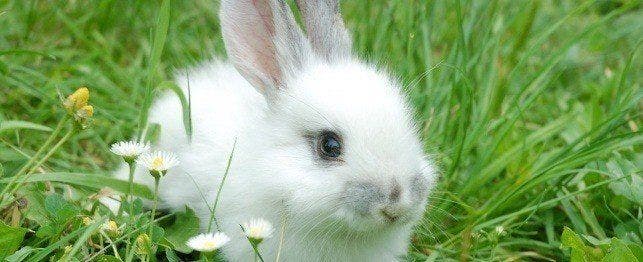
Summer Rabbit Care
Whether living outdoors or indoors, rabbits are heat-sensitive. If the temperature begins to creep over 80 degrees Fahrenheit, you should take extra precautions to prevent heat stroke and death in rabbits.
If you work away from home during the day, make sure someone comes home midday to cool your rabbit down, provide shade, turn on fans if indoors, and place several 2-liter bottles of frozen water in his cage, tightly capped. More frequent grooming in the summer can remove excess hair and help keep your rabbit cool.
Special Outdoor Concerns
- Housing: If possible, bring your rabbit inside at night when the risk of predators is highest. If you cannot, then double-enclose your rabbit’s cage by placing it inside a dog run or even a barn where your horses are secured for the night. Make sure the cage is free of leaks, has a sturdy roof and sides, small mesh wire without any sharp areas, wood without splinters, and a sturdy lock. In the daytime, the hutch should be placed in an area that provides continuous shade.
- Bedding: Provide soft bedding and a large litter box. Use litter such as Carefresh or similar paper litter, or even straw. Make sure your rabbit is able to get off the cage wire, or he will end up with sores on the bottoms of his delicate paws. Bedding and litter should be changed frequently to reduce the risk of illness associated with accumulated feces or ammonia.
- Diet: Provide plain rabbit pellets, plenty of hay (timothy and oat hay), fresh water and vegetables, changed daily. Remove any vegetables not eaten in a few hours. Water is a critical item in the summer. Your rabbit must have constant access to fresh clean water to help keep him cool.
- Go out often and check on your rabbit. Look at his demeanor, his droppings, and food intake. While outside, groom him and check for injuries or any abnormalities. This is a great time to bond with your outdoor rabbit.
Special Indoor Concerns
- Housing: Rabbits enjoy chewing so keep your electric cords or cables safely hidden or covered with hard plastic. In homes without air conditioning, fans and bottles of frozen water are very important to help your rabbit stay cool.
- Diet: Provide plain rabbit pellets, plenty of hay (timothy and oat hay), fresh water and vegetables, changed daily. Remove any vegetables not eaten in a few hours. Water is a critical item in the summer. Your rabbit must have constant access to fresh clean water to help keep him cool.
- Rabbits are most active dawn and dusk, preferring to sleep during the daylight hours. Play with him early in the morning or as it begins to get dark. Your experience will be more rewarding if you keep to his schedule. Groom your rabbit daily to remove loose hair. Often indoor rabbits will shed more as it is too warm for them. Keep them in the coolest part of your home.